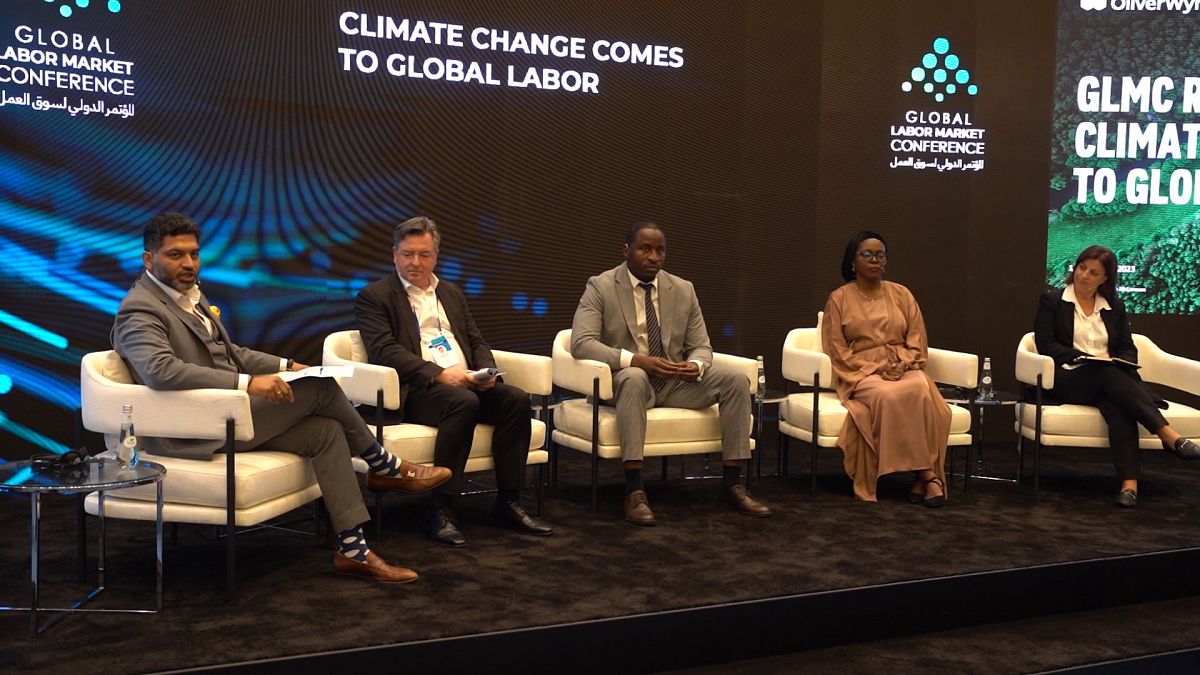Developments in labour laws, standards, and policies were all on the table at the first Global Labor Market Conference in Saudi Arabia.
Innovators, executives and G20 labour ministers convened in Saudi Arabia on December 13 and 14 for the Global Labor Market Conference.
Delegates from more than 40 countries attended with the goal of bolstering labour market resilience both domestically and internationally.
“We realised that if we put the minds of regulators, economists, academics, employers, employees, unions and international NGOs together … we can put thought towards more prosperous global labour markets," said Dr Ahmad Al-Yamani, Vice Chair of the GLMC Scientific Committee and CEO of Takamol Holding.
The conference took place in partnership with the UN International Labor Organisation (ILO) and the World Bank, which shared the findings of its World Development Report 2023: Migrants, Refugees & Societies, with attendees.
“We're going to need increased migration and that also means we need increased intervention from origin and destination countries in a coordinated manner,” Dr. Çağlar Özden, the World Bank’s lead research economist and report co-director, told Euronews.
A pivotal time for the global workforce
In his opening remarks, Ahmad Bin Sulaiman Al Rajhi, Saudi Arabia’s Minister of Human Resources and Social Development said the conference was taking place at a pivotal time for the global workforce.
“What we are seeing is the transformation of the world’s labour markets and ever more demand for the work and skills of tomorrow.”
Key discussions on the ground included the impact of AI on the global workforce, a widening skills gap? and the so-called productivity conundrum whereby innovative technologies fail to deliver expected output returns.
“A theme of this conference is Artificial Intelligence, and we know that 50% of jobs might disappear in the coming years because of AI, but definitely, there will be other jobs that will be created,” Al Rajhi told Euronews.
“The latest statistics show that more than 133 million jobs will be created from now until 2030. So, we need to improve the skills of the labour force to be ready for these jobs,” he added.
The Minister highlighted some of the Kingdom’s recent milestones, including the record increase of private sector Saudis from 1.7 million to 2.3 million.
He also highlighted youth participation with a particular focus on new graduates.
Europe’s ageing population challenge
While some nations have young populations bolstering their labour markets, other European countries face the opposite problem, like Greece.
The country’s labour minister said that an aging demographic remained a primary concern for the years ahead.
“This is a very big problem for us, maybe for the whole of the European Union and maybe for the whole of the West,” Adonis Georgiadis told Euronews.
“The population is ageing fast; births are declining fast. Maybe AI will help us with that, to be honest, because some of the jobs that now will need human force in the future will not need a human (work) force anymore.”
Despite Greece historically having one of the highest unemployment rates in the world, Georgiadis was optimistic about 2024’s labour market outlook.
“For the first time in 14 years we are below 10% (at) 9.6%,” he said. “We had reached 27%, so I think we are going in the right direction. We will need two or three years to reach the European average unemployment rate.”
Balancing energy and labour market transitions
Additional trends on the agenda at the GLMC were climate change and natural resource degradation, specifically the ways they affect how populations produce, consume, trade and work.
“I think the most fundamental challenge that we see is the significant migration that climate change is creating. The World Bank estimates about 140 million people have migrated already and about 1.2 billion in 2050. And that creates a set of population that requires gainful employment,” said Abhishek Sharma, Partner of Public Sector & Policy, Oliver Wyman.
“But, unfortunately, a lot of that is in the low-income, low-skill sector. Now, at the same time, there's a large talent demand - millions of jobs that are needed - for climate mitigation and climate adaptation actions. But most of these jobs instead are at a higher skill level,” he said.
“So, the fundamental challenge is how do you take that primarily low income, low skilled additional supply that's being created, and make sure that we have the talent that is required to get our climate mitigation, climate adaptation actions going.”
An ongoing challenge for the private sector and policy makers is to ensure nobody is left behind in the delivery of a just, inclusive and equitable transition for energy and the international labour markets.
Calling for more gender-focused frameworks and investments was Africa’s first nationalised behavioural initiative for positive policy and social impact.
“Women, make up a large proportion of the agricultural sector in the Global South - up to 70% - and they’re most likely to be working on farms in low-level, low-skilled, labour-intensive jobs,” said Dr Osasuyi Dirisu, executive director of the Policy Innovation Centre, an initiative of the Nigeria Economic Summit Group (NESG).
“So, when climate change strikes and you have flooding and jobs are lost, land is lost, she has to sometimes pull her children out of school. Now, these children will contribute to the future unskilled labour market and that continues the vicious cycle,” she added.
Labour market model makeovers
As GLMC drew to a close in Saudi, it was almost the end of the working week for some delegates.
Andrew Barnes rolled out his disruptive four-day week model in 2019 and since then it’s been adopted in countries from Australia to the UK – and with companies like Lamborghini.
Barnes believes that if companies started measuring their output, instead of believing time spent in the office was a proxy for productivity, it would be game-changing.
“We call it the 100-80-100 rule,” the co-founder of the 4 Day Week Global told Euronews. “That’s 100% pay and 80% time, provided you get 100% productivity. To do that, you've got to engage your workforce. This is bottom-up process re-engineering. And when you do it, you find that you get healthier, happier, more engaged employees. And who would have thought that healthier, happier and more engaged employees would be more productive?”
Discussions amongst delegates will no doubt carry on next year, with business executives and policymakers set to reconvene for the second edition of GLMC in Saudi Arabia next year.

